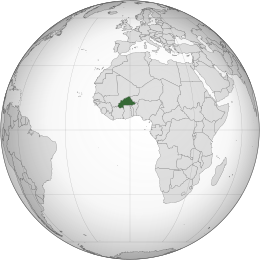More languages
More actions
(Added detail to post-coup events) Tag: Visual edit |
mNo edit summary Tag: Visual edit |
||
| Line 4: | Line 4: | ||
== History == | == History == | ||
=== Neocolonial rule === | |||
The Upper Volta was [[Colonialism|colonized]] by the [[French Republic|French]] and became independent in 1960. After independence, it became the [[Neocolonialism|neocolonial]] [[Republic of Upper Volta (1958–1984)|Republic of Upper Volta]], which was one of the poorest and least literate countries in the world. Before Sankara's revolution in 1983, the life expectancy was only 40 years and only 2% of the population could read.<ref name=":0">{{Web citation|author=Curry Malott|newspaper=[[Liberation School]]|title=Thomas Sankara: Leadership and action that inspires 71 years later|date=2020-12-21|url=https://www.liberationschool.org/thomas-sankara-71-years-later/|archive-url=https://web.archive.org/web/20220404114917/https://www.liberationschool.org/thomas-sankara-71-years-later/|archive-date=2022-04-04|retrieved=2022-09-03}}</ref> | The Upper Volta was [[Colonialism|colonized]] by the [[French Republic|French]] and became independent in 1960. After independence, it became the [[Neocolonialism|neocolonial]] [[Republic of Upper Volta (1958–1984)|Republic of Upper Volta]], which was one of the poorest and least literate countries in the world. Before Sankara's revolution in 1983, the life expectancy was only 40 years and only 2% of the population could read.<ref name=":0">{{Web citation|author=Curry Malott|newspaper=[[Liberation School]]|title=Thomas Sankara: Leadership and action that inspires 71 years later|date=2020-12-21|url=https://www.liberationschool.org/thomas-sankara-71-years-later/|archive-url=https://web.archive.org/web/20220404114917/https://www.liberationschool.org/thomas-sankara-71-years-later/|archive-date=2022-04-04|retrieved=2022-09-03}}</ref> | ||
=== Revolution === | === Revolution === | ||
{{Main article|Burkinabé Revolution}} | |||
In 1983, Prime Minister and former Secretary of State Thomas Sankara invited [[Libyan Arab Jamahiriya (1977–2011)|Libyan]] leader [[Muammar Gaddafi|Muammar Qaddafi]] to Upper Volta without permission from President [[Jean-Baptiste Ouédraogo]]. Protests began in May after Ouédraogo arrested Sankara, leading to a military coup that made Sankara president. | In 1983, Prime Minister and former Secretary of State Thomas Sankara invited [[Libyan Arab Jamahiriya (1977–2011)|Libyan]] leader [[Muammar Gaddafi|Muammar Qaddafi]] to Upper Volta without permission from President [[Jean-Baptiste Ouédraogo]]. Protests began in May after Ouédraogo arrested Sankara, leading to a military coup that made Sankara president. | ||
Revision as of 18:35, 25 December 2024
| Burkina Faso 𞤄𞤵𞤪𞤳𞤭𞤲𞤢 𞤊𞤢𞤧𞤮 | |
|---|---|
 | |
| Capital and largest city | Ouagadougou |
| Official languages | French |
| Government | Military junta |
• President | Ibrahim Traoré |
| Area | |
• Total | 274,200 km² |
| Population | |
• 2020 estimate | 21,510,181 |
Burkina Faso is a country in West Africa. It was formerly known as Upper Volta before being renamed by Thomas Sankara in 1984.
History
Neocolonial rule
The Upper Volta was colonized by the French and became independent in 1960. After independence, it became the neocolonial Republic of Upper Volta, which was one of the poorest and least literate countries in the world. Before Sankara's revolution in 1983, the life expectancy was only 40 years and only 2% of the population could read.[1]
Revolution
See main article: Burkinabé Revolution
In 1983, Prime Minister and former Secretary of State Thomas Sankara invited Libyan leader Muammar Qaddafi to Upper Volta without permission from President Jean-Baptiste Ouédraogo. Protests began in May after Ouédraogo arrested Sankara, leading to a military coup that made Sankara president.
Within weeks, Sankara's government vaccinated 2.5 million children and began a literacy campaign. By 1987, the literacy rate had increased to 73%. Burkina Faso planted ten million trees to prevent desertification and built roads and railroads. Sankara redistributed land from feudal lords to the peasants, and wheat production per hectare more than doubled.[1]
Counterrevolution
On 15 October 1987, Blaise Compaoré murdered Sankara and took power of the country. He privatized natural resources and joined the IMF. Compaoré ruled until an uprising in 2014.[1]
2022 coups
In January 2022, a group of nationalist military officers overthrew President Roch Kaboré, a wealthy comprador and established the Patriotic Movement for Safeguard and Restoration. Paul-Henri Damiba took power and was initially popular. He expelled hundreds of French troops but failed to defeated Salafi jihadists.[2]
In September 2022, Ibrahim Traoré led another anti-French coup. In February 2023, he met with the governments of Guinea and Mali and proposed creating a federation. He criticized the African Union for siding with the West.[3] Traoré appointed Apollinaire Tambèla, a former ally of Sankara, as prime minister to help with the "refoundation of the nation."[2]
On September 16 2023, Niger, Burkina Faso, and Mali formed a collective defense pact called the Alliance of Sahel States (AES), in which an attack on one of the countries is regarded as an attack on the other members.[4]
References
- ↑ 1.0 1.1 1.2 Curry Malott (2020-12-21). "Thomas Sankara: Leadership and action that inspires 71 years later" Liberation School. Archived from the original on 2022-04-04. Retrieved 2022-09-03.
- ↑ 2.0 2.1 Ben Norton (2023-07-31). "Burkina Faso’s new president condemns imperialism, quotes Che Guevara, allies with Nicaragua, Venezuela, Cuba" Geopolitical Economy Report. Retrieved 2023-08-03.
- ↑ Vijay Prashad, Kambale Musavuli (2023-08-01). "Niger Is the Fourth Country in the Sahel to Experience an Anti-Western Coup" Independent Media Institute. Retrieved 2023-08-03.
- ↑ "Mali, Niger and Burkina Faso sign Sahel security pact" (2023-09-16). Reuters. Archived from the original on 2023-09-17. Retrieved 2023-10-01.


